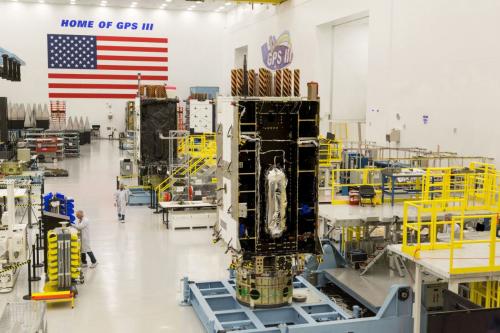Releases

DENVER, Sept. 6, 2018 – Once the next-generation GPS III satellites begin launching later this year, a series of updates to the current ground control system from Lockheed Martin (NYSE: LMT) will help the U.S. Air Force gain early command and control of the new satellites for testing and operations.
In 2016 and 2017, the Air Force placed Lockheed Martin under two contracts, called GPS III Contingency Operations (COps) and M-Code Early Use (MCEU), which directed the company to upgrade the existing Architecture Evolution Plan (AEP) Operational Control System (OCS), which operates today’s GPS constellation. These upgrades to the AEP OCS are intended to serve as gap fillers prior to the entire GPS constellation’s operational transition to the next generation Operational Control System (OCX) Block 1, now in development.
In April 2018, the Air Force approved Lockheed Martin’s critical design for MCEU, essentially providing a “green light” for the company to proceed with software development and systems engineering to deploy the M-Code upgrade to the legacy AEP OCS. The Air Force gave a similar nod to COps in November 2016. COps is now on schedule for delivery in May 2019 and MCEU is scheduled for delivery in January 2020.
“The Air Force declared the first GPS III satellite ‘Available for Launch’ last year, and it’s expected to launch later this year. Nine more GPS III satellites are following close behind in production flow,” explained Johnathon Caldwell, Lockheed Martin’s program manager for Navigation Systems. “GPS III is coming soon, and as these satellites are launched, COps and MCEU will allow the Air Force the opportunity to integrate these satellites into the constellation and to start testing some of GPS III’s advanced capabilities even earlier.”
MCEU Capabilities:
Part of the Air Force’s overall modernization plan for the GPS, M-Code is an advanced, new signal designed to improve anti-jamming and anti-spoofing, as well as to increase secure access to military GPS signals for U.S. and allied armed forces.
To accelerate M-Code’s deployment to support testing and fielding of modernized user equipment in support of the warfighter, MCEU will upgrade the AEP OCS, allowing it to task, upload and monitor M-Code within the GPS constellation. MCEU will provide command and control of M-Code capability to eight GPS IIR-M and 12 GPS IIF satellites currently on orbit, as well as future GPS III satellites.
COps Capabilities:
Following launch and check out, each future GPS III satellite will take its place in the GPS constellation. The COps modifications will allow the AEP OCS to support these more powerful GPS III satellites, enabling them to perform their positioning, navigation and timing missions for more than one billion civil, commercial and military users who depend on GPS every day. Besides the addition of GPS III, COps will also continue to support all the GPS IIR, IIR-M and IIF satellites in the legacy constellation.
Lockheed Martin has a long history of supporting ground systems, providing operations, sustainment and logistics support for nearly 60 Department of Defense satellites, including GPS, often allowing them to double their on-orbit operational design life.
Lockheed Martin also is currently under contract to develop and build ten GPS III satellites, which will deliver three times better accuracy and provide up to eight times improved anti-jamming capabilities. GPS III's new L1C civil signal also will make it the first GPS satellite to be interoperable with other international global navigation satellite systems.
For additional GPS III information, photos and video visit: www.lockheedmartin.com/gps.
About Lockheed Martin
Headquartered in Bethesda, Maryland, Lockheed Martin is a global security and aerospace company that employs approximately 100,000 people worldwide and is principally engaged in the research, design, development, manufacture, integration and sustainment of advanced technology systems, products and services. This year the company received three Edison Awards for ground-breaking innovations in autonomy, satellite technology and directed energy.
SOURCE: Lockheed Martin

